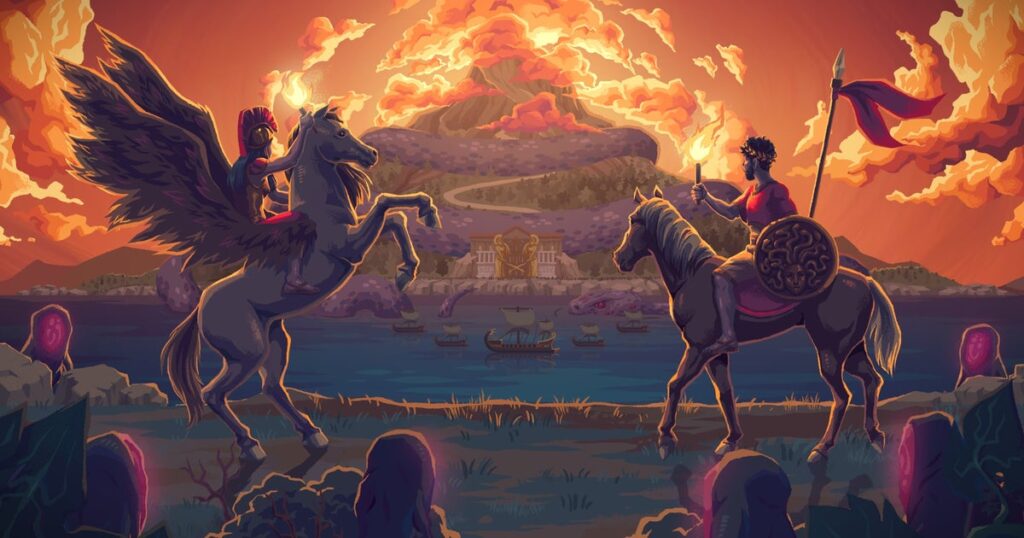I still remember it well: I was at EGX 2015 in Birmingham and a game turned my head like a doorknob. It wasn’t one of the blockbusters, or one of the games with an obvious booth, but a much smaller game on several screens, nestled among many others. On that screen was what looked to me like a fairy tale of pixel art. A person wearing a crown sat on a horse in a wooded area, with water in the foreground of the image mirroring the scene above. It felt like it was breathing as I watched it. I was fascinated. When I played it, the feeling intensified. There were no instructions on what to do in the game, so I had to feel it out, galloping left and right on my horse, collecting coins, then dropping them to do various, inexplicable things. Then night came and strange creatures broke into my base, who stole my money and the crown I was wearing. I had to start over. What happened? I had no idea. But I knew I wanted to play again.
Annoyed, I met the person who was showing that game at a hotel bar later that day. They were from a company I had never heard of before that day, and they told me this was their first match. The company’s name, they said, was Raw Fury, and the game I’d been playing was Kingdom: New Lands. Apparently, that encounter stuck with me, but I had no idea that nearly 10 years later I would be at the studio’s headquarters in Stockholm playing Kingdom again.
The Kingdom remains as important to Raw Fury now as it was then. It supports everything the boutique indie publisher does. Kingdom was actually created in 2010, before Raw Fury came along. Legend has it that Thomas van den Berg, AKA Noio, who created the game with Marcus Banacle, AKA Jamball, originally did so as a study of pixel art in horse riding. Slowly, though, the game took on the look of flanking tower defense and the Kingdom’s identifiable cornerstones—expanding a base by picking up and dropping coins, defeating the portals at the far left and right ends of the map where enemies come from, and night survivors – were introduced.
Raw Fury launched Kingdom: New Lands in 2016, reintroducing the concept to the world. The company then followed it up two years later with Kingdom: Two Crowns, adding split-screen co-op so two people could work on the same base at the same time. It has since been expanded into Two Crowns with a Norse mythology expansion, a 1980s expansion (in which you brilliantly ride a BMX rather than a horse), and a samurai-themed expansion. These can be built on the same basic game, but they add so much that they can also be standalone games. The same is true for the brand new expansion I’m in Sweden playing right now: the Greek mythology-themed Call of Olympus, which has just been announced.
In it, you play as an ancient Greek leader who, as always in the series, slowly creates a kingdom and protects it from the creatures of Greed that run nightly from the portals. But unlike other Kingdom games, there is now a quest system, where you can take on missions from popular Greek gods. From this comes a tangible sense of story in the game, which is something it hasn’t had before. You can create different kingdoms for different gods as you work your way around an archipelago towards Mount Olympus, where a divine showdown awaits. With this focus on exploration comes the ability to lead your troops from your base and into battle, taking the fight to them instead of waiting for them to come to you. And if you are successful, the gods will be generous in their rewards, bestowing upon you powerful weapons. You can use magic bows to throw arrows at areas, or a magic hammer to smash into the ground to make it burn. Kingdom is more of a Call of Olympus RPG than it has ever been before. And did I mention there are rideable pegasus and bears?
Downstairs, it’s still the Kingdom of course. The core is sacred and the team is cautious about overadding it and deprecating it. You still walk left and right, collecting coins and then throwing them away to build things and recruit troops, and your goal is still to expand the walls and extent of your kingdom. There’s a bit of guidance available from an oracle now so you don’t lose your way in what you’re supposed to do for the gods, but otherwise, it’s still a game about discovery – still a game about flipping coins to see what happens, instead of being told where to go and what to do.
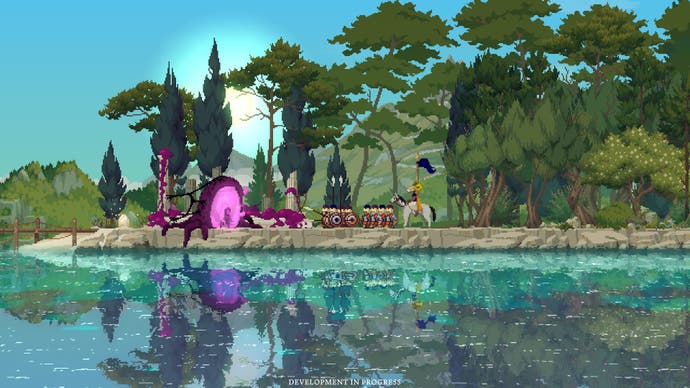

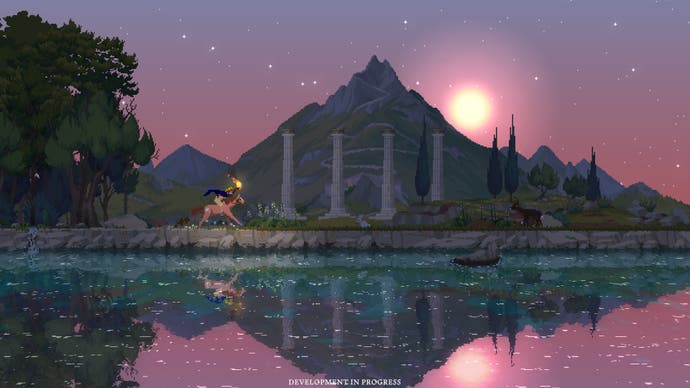
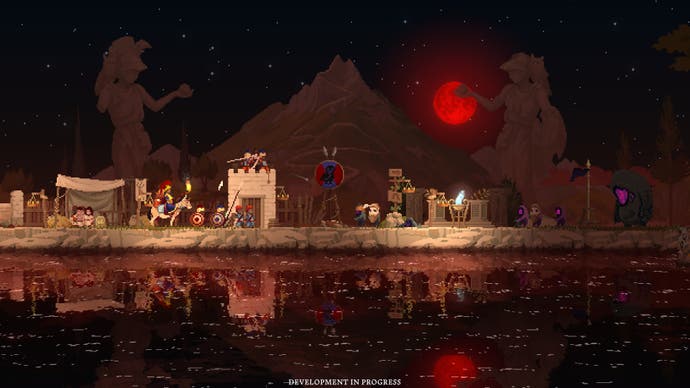
It’s still as beautiful as it was, too – more beautiful, even. There is more detail in the world because more people are working on the game now, so the animations are more complex and there are more visual flourishes to please you. Tiny wisps of pixelated smoke rise into the air from the torches, tiny pixelated birds flutter by. Greek mythology also creates a wonderful setting for the game, with its white marble walls and towering pillars, its humming summer evenings, and its litany of colorful gods and powers. It’s all here. In Call of Olympus, the Kingdom is in great shape.
People talk openly at Raw Fury headquarters about the Kingdom’s importance to the company. It’s the flagship franchise here, clearly, and it feels like the engine that powers what the company does. Raw Fury actually bought the IP from Thomas van den Berg in 2019, and now has an in-house development of about a dozen people dedicated to making it, which I think is the company’s only in-house development team ( based in Croatia, so I don’t see it in Stockholm). However, Van den Berg still works with Raw Fury. The company released his game Cloud Gardens in 2021 and Pizza Possum in 2023, so the relationship continues, which is nice to see.
Beyond being an enjoyable series in its own right, Kingdom provides the safety net Raw Fury needs to do what it has done in the nine years it’s been around, which is become an identifiable provider of smaller, interesting games. I had a surprising amount of them, I realize, looking at the many framed images of them on the walls of the large town house where the company resides. Among them: Skald, Sable, Call of the Sea, Bad North, Norco, Animal cassette, Snufkin: Melody of Moominvalley, Townscaper, Atomicrops. We’ve reviewed them all at Eurogamer, and they’ve all scored highly. Raw Fury rarely seems to be missing.
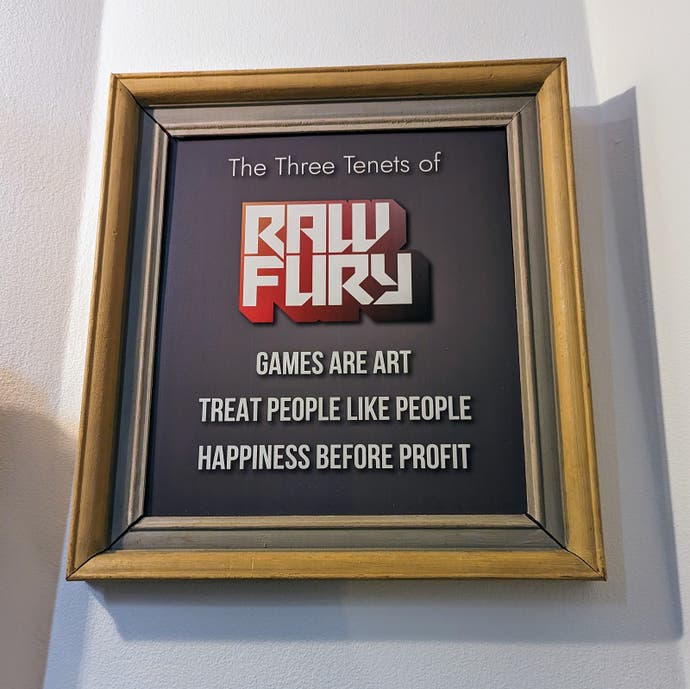
But what strikes me the most as I walk through the townhouse, which has a surprising number of stairs, as well as two large dogs milling around, wonderfully, is how often I see the company’s motto reinforced. . It’s there, replicated on walls and walkways for all to see. “The Three Principles of Raw Fury,” it reads. “Games are art. Treat people like people. Happiness before profit.” On another wall: “Games are art.” And again, and again.
A few years ago, I probably would have bristled at this. You’ll probably remember the endless debates about “are games art?” as much as we – they came out so much that it became a cliché. But I don’t get sick of seeing it on the walls of Raw Fury today. In 2024, that mantra shines like a beacon across an industry awash in seas. It stands in stark contrast to the endless layoffs and studio closings we’ve been witnessing. Just a month ago, we wondered what Xbox’s purpose was after the company shuttered Arkane Austin and Tango Gameworks — a thought that could apply to Take-Two shutting down Roll7 and many other layoff announcements. The overriding feeling emanating from all of this was greed—coincidentally the main evil in the Kingdom series. Games as a way to earn money. Profit before people.
It’s against that backdrop that Raw Fury shines so brightly. Hope is what I feel walking around her, because not only is this diametrically opposed approach refreshing—really refreshing—it also seems to be working. It shows that supporting creativity is a viable thing to do. Granted, the company operates on a different scale than successful development, but perhaps there is also a lesson. Perhaps spreading your bet over smaller things is a more sustainable — and creative — way to go. Raw Fury’s catalog certainly reminds me of how eclectic and interesting gaming can be. It shows what can be done when making money is not the primary concern.
If the Kingdom is enabling this: wonderful. But whatever the reason, what the company is doing is a joy to watch. Raw Fury and Kingdom walk hand in hand, and their journey may continue to be a long one.
This piece was written after a press trip to Raw Fury in Stockholm. Raw Fury paid for flights and accommodation.
